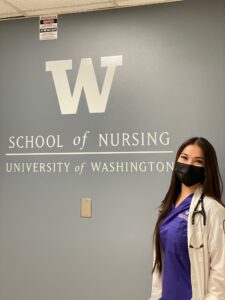 Dariga Tugan is an ABSN student and one of the de Tornyay Center’s 2022-2023 Healthy Aging Undergraduate Scholars. Her project is “A descriptive analysis of variability in exercise (VO2 Max) to address differences in physical function and alleviation of symptoms in older adults living with HIV”. Her faculty mentor is Dr. Allison Webel.
Dariga Tugan is an ABSN student and one of the de Tornyay Center’s 2022-2023 Healthy Aging Undergraduate Scholars. Her project is “A descriptive analysis of variability in exercise (VO2 Max) to address differences in physical function and alleviation of symptoms in older adults living with HIV”. Her faculty mentor is Dr. Allison Webel.
Why did you choose nursing?
I chose nursing because it’s an interesting blend of arts and sciences where you get to tailor your care to the patient’s needs. I wanted to master the art of spreading love during times of fear and uncertainty in people’s lives. Spreading joy, helping people heal, and understanding the human body with its interactions in medicine is beautiful to me.
What interested you about nursing research?
I absolutely love research. In my free time, I’d often print out articles from PubMed and just read through them. But the reason why I got interested in research was, unfortunately, health care is extremely racist. A lot of our research is catered to white males.
The way that our health care system works is the therapies, the medications, even the non-pharmacologic therapies are all based on research, which is primarily done on white males. So, entering the space where you can advocate for more diversity and bridge that huge lack of diversity in research, specifically with people of color, was a big interest to me.
What interested you about healthy aging?
I started off my nursing career in a nursing home around 2020. I became passionate about alleviating suffering for those during the final stages of their lives because oftentimes I was the last person that patients would see as they passed. The reason for this is our facility didn’t allow any visitors during the height of the pandemic, and I began to ask myself questions. How do I utilize my privilege of being the last person they see to ensure that they are suffering less? Is restricting access to seeing their family really benefiting or keeping older adults safe in the pandemic?
I would see how this nursing home specifically would charge patients fifteen thousand dollars a month for subpar care. I got really interested in brainstorming new ideas and solutions to address healthy aging and the gerontology populations. It was these ideas that drew me to join the honors route for the BSN program to better understand and create awareness around the need for quality nursing homes, especially for the people who can’t afford them.
Could you briefly describe your project?
It’s a descriptive analysis of variability and exercise to address differences in physical health, aka the VO2 max, in older adults living with HIV. VO2 Max is a measure of cardiovascular fitness and aerobic insurance based on the maximal oxygen consumption of individuals in a defined exercise protocol.
There’s a myriad of research surrounding VO2 Max in older adults, and it’s actually the strongest independent predictor of future life expectancy in both healthy and individuals with cardiorespiratory disease.
We have a lot of studies on VO2 Max and exercise in older adults, as well as exercise in older adults living with HIV, and VO2 Max and HIV specifically. But my study would be addressing the gaps in our knowledge. Specifically, the data will be surveyed using VO2 max at baseline and excelerometry at baseline between decades of people in their fifties, sixties, and seventies.
A lot of these studies also do not focus on older adults with HIV, so data that compares the age groups would be of utmost importance.
I did a literature review and there’s a call for action to have better definitions and studies on interventions that can improve physical function and VO2 Max in HIV-infected patients. I think that these data that I analyze can inform and empower older adults living with HIV to engage in strategies to improve their physical function.
What are your plans after graduation?
I plan on working in ICU, but I am dual enrolled in a post-bacc premed program right now, so I’m applying to medical school in October. I love pharmacology and pathophysiology. I think that becoming an ICU nurse and then going to medical school will allow me to study more pathophysiology, but also bring an interesting nursing perspective, which is holistic.
Is there anything else you want to share?
I’m an immigrant from Almaty, Kazakhstan, and not many people know what Kazakhstan is. But it is the ninth biggest country in the world. It was a part of the Soviet Union, so they speak Russian there. It has a huge Russian culture. A lot of the background is also Muslim. So you have the Muslim culture, the Russian culture, and our own Kazak culture, which is a nomadic culture, which is beautiful because you have such an intersection of so many different personalities and viewpoints.
It’s allowed me to be diverse in my own thinking and the way I approach people and solutions. My own family is Christian. Balancing my relatives being Muslim and then my own Christian family, it’s all balanced like the yin and yang of life. I love being an immigrant, and I like being from Kazakhstan.
(Article correction: The original article mentioned a lack of women in research before 1976, which has been removed, as there were clinical trials before that date which included women).